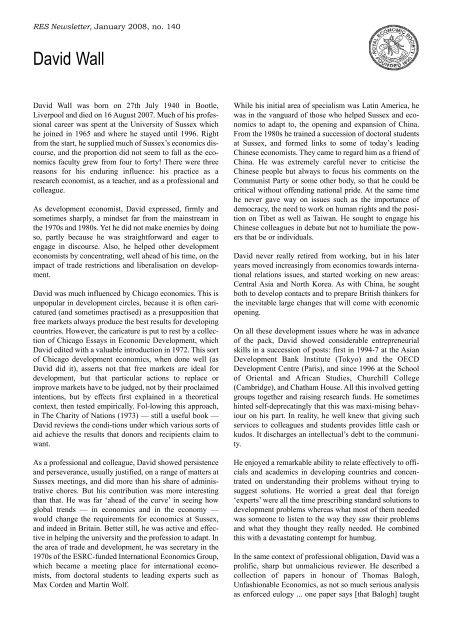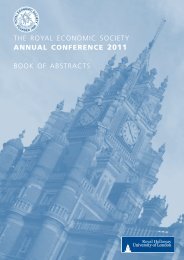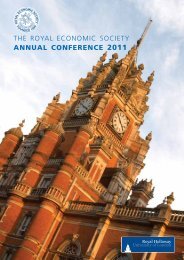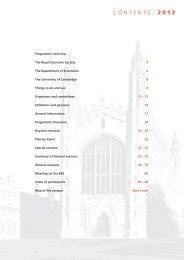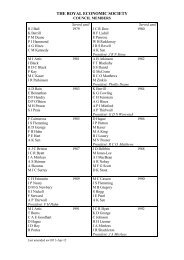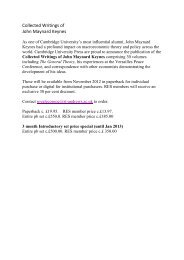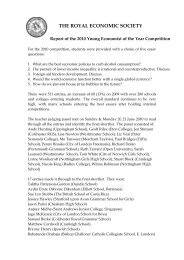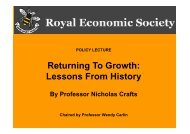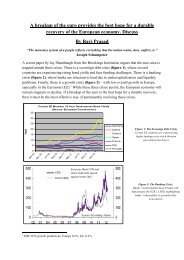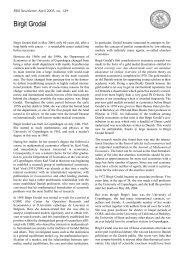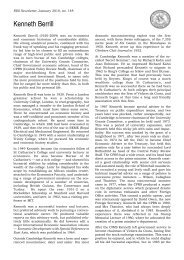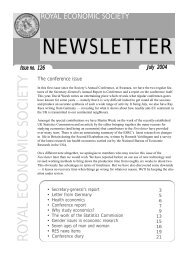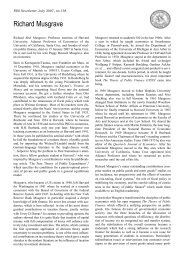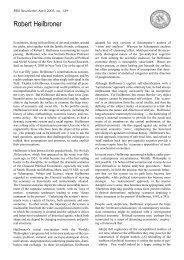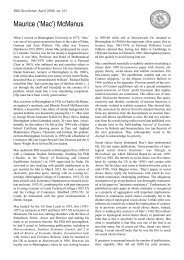David Wall
David Wall
David Wall
You also want an ePaper? Increase the reach of your titles
YUMPU automatically turns print PDFs into web optimized ePapers that Google loves.
RES Newsletter, January 2008, no. 140<br />
<strong>David</strong> <strong>Wall</strong><br />
<strong>David</strong> <strong>Wall</strong> was born on 27th July 1940 in Bootle,<br />
Liverpool and died on 16 August 2007. Much of his professional<br />
career was spent at the University of Sussex which<br />
he joined in 1965 and where he stayed until 1996. Right<br />
from the start, he supplied much of Sussex’s economics discourse,<br />
and the proportion did not seem to fall as the economics<br />
faculty grew from four to forty! There were three<br />
reasons for his enduring influence: his practice as a<br />
research economist, as a teacher, and as a professional and<br />
colleague.<br />
As development economist, <strong>David</strong> expressed, firmly and<br />
sometimes sharply, a mindset far from the mainstream in<br />
the 1970s and 1980s. Yet he did not make enemies by doing<br />
so, partly because he was straightforward and eager to<br />
engage in discourse. Also, he helped other development<br />
economists by concentrating, well ahead of his time, on the<br />
impact of trade restrictions and liberalisation on development.<br />
<strong>David</strong> was much influenced by Chicago economics. This is<br />
unpopular in development circles, because it is often caricatured<br />
(and sometimes practised) as a presupposition that<br />
free markets always produce the best results for developing<br />
countries. However, the caricature is put to rest by a collection<br />
of Chicago Essays in Economic Development, which<br />
<strong>David</strong> edited with a valuable introduction in 1972. This sort<br />
of Chicago development economics, when done well (as<br />
<strong>David</strong> did it), asserts not that free markets are ideal for<br />
development, but that particular actions to replace or<br />
improve markets have to be judged, not by their proclaimed<br />
intentions, but by effects first explained in a theoretical<br />
context, then tested empirically. Fol-lowing this approach,<br />
in The Charity of Nations (1973) — still a useful book —<br />
<strong>David</strong> reviews the condi-tions under which various sorts of<br />
aid achieve the results that donors and recipients claim to<br />
want.<br />
As a professional and colleague, <strong>David</strong> showed persistence<br />
and perseverance, usually justified, on a range of matters at<br />
Sussex meetings, and did more than his share of administrative<br />
chores. But his contribution was more interesting<br />
than that. He was far ‘ahead of the curve’ in seeing how<br />
global trends — in economics and in the economy —<br />
would change the requirements for economics at Sussex,<br />
and indeed in Britain. Better still, he was active and effective<br />
in helping the university and the profession to adapt. In<br />
the area of trade and development, he was secretary in the<br />
1970s of the ESRC-funded International Economics Group,<br />
which became a meeting place for international economists,<br />
from doctoral students to leading experts such as<br />
Max Corden and Martin Wolf.<br />
While his initial area of specialism was Latin America, he<br />
was in the vanguard of those who helped Sussex and economics<br />
to adapt to, the opening and expansion of China.<br />
From the 1980s he trained a succession of doctoral students<br />
at Sussex, and formed links to some of today’s leading<br />
Chinese economists. They came to regard him as a friend of<br />
China. He was extremely careful never to criticise the<br />
Chinese people but always to focus his comments on the<br />
Communist Party or some other body, so that he could be<br />
critical without offending national pride. At the same time<br />
he never gave way on issues such as the importance of<br />
democracy, the need to work on human rights and the position<br />
on Tibet as well as Taiwan. He sought to engage his<br />
Chinese colleagues in debate but not to humiliate the powers<br />
that be or individuals.<br />
<strong>David</strong> never really retired from working, but in his later<br />
years moved increasingly from economics towards international<br />
relations issues, and started working on new areas:<br />
Central Asia and North Korea. As with China, he sought<br />
both to develop contacts and to prepare British thinkers for<br />
the inevitable large changes that will come with economic<br />
opening.<br />
On all these development issues where he was in advance<br />
of the pack, <strong>David</strong> showed considerable entrepreneurial<br />
skills in a succession of posts: first in 1994-7 at the Asian<br />
Development Bank Institute (Tokyo) and the OECD<br />
Development Centre (Paris), and since 1996 at the School<br />
of Oriental and African Studies, Churchill College<br />
(Cambridge), and Chatham House. All this involved getting<br />
groups together and raising research funds. He sometimes<br />
hinted self-deprecatingly that this was maxi-mising behaviour<br />
on his part. In reality, he well knew that giving such<br />
services to colleagues and students provides little cash or<br />
kudos. It discharges an intellectual’s debt to the community.<br />
He enjoyed a remarkable ability to relate effectively to officials<br />
and academics in developing countries and concentrated<br />
on understanding their problems without trying to<br />
suggest solutions. He worried a great deal that foreign<br />
‘experts’ were all the time prescribing standard solutions to<br />
development problems whereas what most of them needed<br />
was someone to listen to the way they saw their problems<br />
and what they thought they really needed. He combined<br />
this with a devastating contempt for humbug.<br />
In the same context of professional obligation, <strong>David</strong> was a<br />
prolific, sharp but unmalicious reviewer. He described a<br />
collection of papers in honour of Thomas Balogh,<br />
Unfashionable Economics, as not so much serious analysis<br />
as enforced eulogy ... one paper says [that Balogh] taught
his pupils that it was right to say what they believed. Is it<br />
more accurate to say: he taught his pupils to say that what<br />
they believed was right? Another provocative review article<br />
was The New Missionaries, deconstructing (i.e. taking to<br />
pieces) the International Labour Offices 1971 analysis of<br />
Sri Lankas employment problems.<br />
As a teacher, <strong>David</strong> is fondly remembered by many students<br />
(including over 20 PhDs) as patient, informed, and<br />
often inspiring. He helped many new arrivals, first from<br />
Latin America and later from Africa and especially China,<br />
to adapt to different conditions of both life and study. His<br />
successes are embodied in many who carry forward his<br />
work and analytical spirit around the world. He had a huge<br />
effect on their lives and since his death many have written<br />
to express gratitude for his strenuous efforts to provide the<br />
supervision they needed, whatever the difficulties they<br />
were facing. One of them subsequently wrote ‘He steered<br />
me through my thesis. I would never have made it without<br />
his support and friendship.’ <strong>David</strong> never bowed to fashion,<br />
never grand-standed. He was one of the most honest people<br />
I ever had anything to do with. And he cared. He went out<br />
of his way to be supportive, way beyond the formal requirements<br />
of academic supervision. That is how we became<br />
friends and stayed in touch for more than 30 years.’<br />
I am pleased and lucky to have known <strong>David</strong> as economist,<br />
researcher, teacher, reviewer and profes-sional, and above<br />
all as a close friend for many years. Together with his wife<br />
Nancy, I have enjoyed the wines they shared so generously,<br />
their collection of classical music, the paintings that he collected<br />
in China, the garden he and she grew, the countryside<br />
where he loved to walk. You can see in <strong>David</strong>’s interests,<br />
house, garden, and above all family, the Sussex University<br />
ethos of looking across disciplines towards a broader context<br />
of human activities that, somehow, fit into each other.<br />
Based upon a funeral address by Michael Lipton,<br />
University of Sussex, with contributions from Nancy <strong>Wall</strong>.


